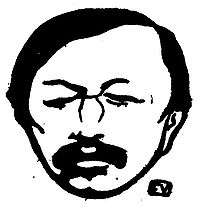Gustave Kahn

Gustave Kahn (21 December 1859, in Metz – 5 September 1936, in Paris) was a French Symbolist poet and art critic.
Personal life
| French literature |
|---|
| by category |
| French literary history |
| French writers |
|
| Portals |
|
Kahn was a Jew from Lorraine. He chose sides with Émile Zola in the Dreyfus affair. His wife Elizabeth converted to Judaism as a protest against anti-semitism, changing her name to Rachel.
Poetry
He claimed to have invented the term vers libre, or free verse;[1] he was in any case one of the first European exponents of the form. His principal publications include Les Palais nomades, 1887, Domaine de fée, 1895, and Le Livre d'images, 1897. Kahn also made a valuable contribution to the history of the movement with his book Symbolistes et décadents, 1902.
Other work
In addition to his poems, Kahn was a public intellectual who wrote novels, plays, and literary criticism. He played a key role in a number of periodicals, including La Vogue, La Revue Indépendante, La Revue Blanche and Le Mercure de France. He was also an art critic and collector who stayed current with developments in painting and sculpture until his death. He also played a role in a number of debates on public issues, including anarchism, feminism, socialism, and Zionism. In the 1920s he was (head)editor of Menorah, a Jewish bimonthly magazine which folded in 1933.
Several of his poems were set to music by the composer Charles Loeffler.
After his death, his manuscripts were placed in the collection of the library of the Hebrew University of Jerusalem.
Quotation
- Les Paons
- Se penchant vers les dahlias,
- Des paons cabraient des rosaces lunaires,
- L'assouplissement des branches vénère
- Son pâle visage aux mourants dahlias.
- Elle écoute au loin les brèves musiques
- Nuit claire aux ramures d'accords,
- Et la lassitude a bercé son corps
- Au rythme odorant des pures musiques.
- Les paons ont dressé la rampe ocellée
- Pour la descente de ses yeux vers le tapis
- De choses et de sens
- Qui va vers l'horizon, parure vermiculée
- De son corps alangui.
- En l'âme se tapit
- le flou désir molli de récits et d'encens.
Principal works

- Palais nomades (1887)
- Les Chansons d'amant (1891)
- Domaine de fée (1895)
- Le Roi fou (1896)
- La Pluie et le beau temps (1896)
- Limbes de lumières (1897)
- Le Livre d'images (1897)
- Premiers poèmes (1897)
- Le Conte de l'or et du silence (1898) translated by Brian Stableford as The Tale of Gold and Silence (2011) ISBN 978-1-61227-063-0
- Les Petites Ames pressées (1898)
- Le Cirque solaire (1898)
- Les Fleurs de la passion (1900)
- L'Adultère sentimental (1902)
- Symbolistes et décadents (1902)
- Odes de la "Raison" (1902 réédité aux Editions du Fourneau 1995)
- Contes hollandais (1903)
- La Femme dans la caricature française (1907)
- Contes hollandais (deuxième série) (1908)
- La Pépinière du Luxembourg (1923)
- L'Aube enamourée (1925)
- Mourle (1925)
- Silhouettes littéraires (1925)
- La Childebert (1926)
- Contes juifs (1926 réédité chez "Les Introuvables" 1977)
- Images bibliques (1929)
- Terre d'Israël (1933)
References
- ↑ Lucie-Smith, Edward. (1972) Symbolist Art. London: Thames & Hudson, p. 58. ISBN 0500201250
External links
| Wikimedia Commons has media related to Gustave Kahn. |
| Wikisource has the text of a 1911 Encyclopædia Britannica article about Gustave Kahn. |
- Works by Gustave Kahn at Project Gutenberg
- Works by or about Gustave Kahn at Internet Archive
- Poems by Gustave Kahn
- (French) Gustave Kahn on the Le judaïsme d'Alsace et de Lorraine - ASIJA website